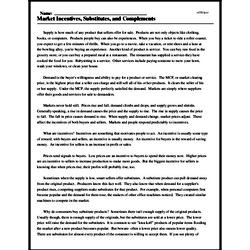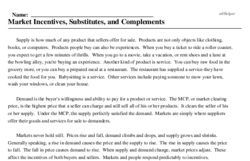Market Incentives, Substitutes, and Complements
Supply is how much of any product that sellers offer for sale. Products are not only objects like clothing, books, or computers. Products people buy can also be experiences. When you buy a ticket to ride a roller coaster, you expect to get a few minutes of thrills. When you go to a movie, take a vacation, or rent shoes and a lane at the bowling alley, you're buying an experience. Another kind of product is service. You can buy raw food in the grocery store, or you can buy a prepared meal at a restaurant. The restaurant has supplied a service-they have cooked the food for you. Babysitting is a service. Other services include paying someone to mow your lawn, wash your windows, or clean your house.
Demand is the buyer's willingness and ability to pay for a product or service. The MCP, or market clearing price, is the highest price that a seller can charge and still sell all of his or her products. It clears the seller of his or her supply. Under the MCP, the supply perfectly satisfied the demand. Markets are simply where suppliers offer their goods and services for sale to demanders.
Markets never hold still. Prices rise and fall, demand climbs and drops, and supply grows and shrinks. Generally speaking, a rise in demand causes the price and the supply to rise. The rise in supply causes the price to fall. The fall in price causes demand to rise. When supply and demand change, market prices adjust. These affect the incentives of both buyers and sellers. Markets and people respond predictably to incentives.




